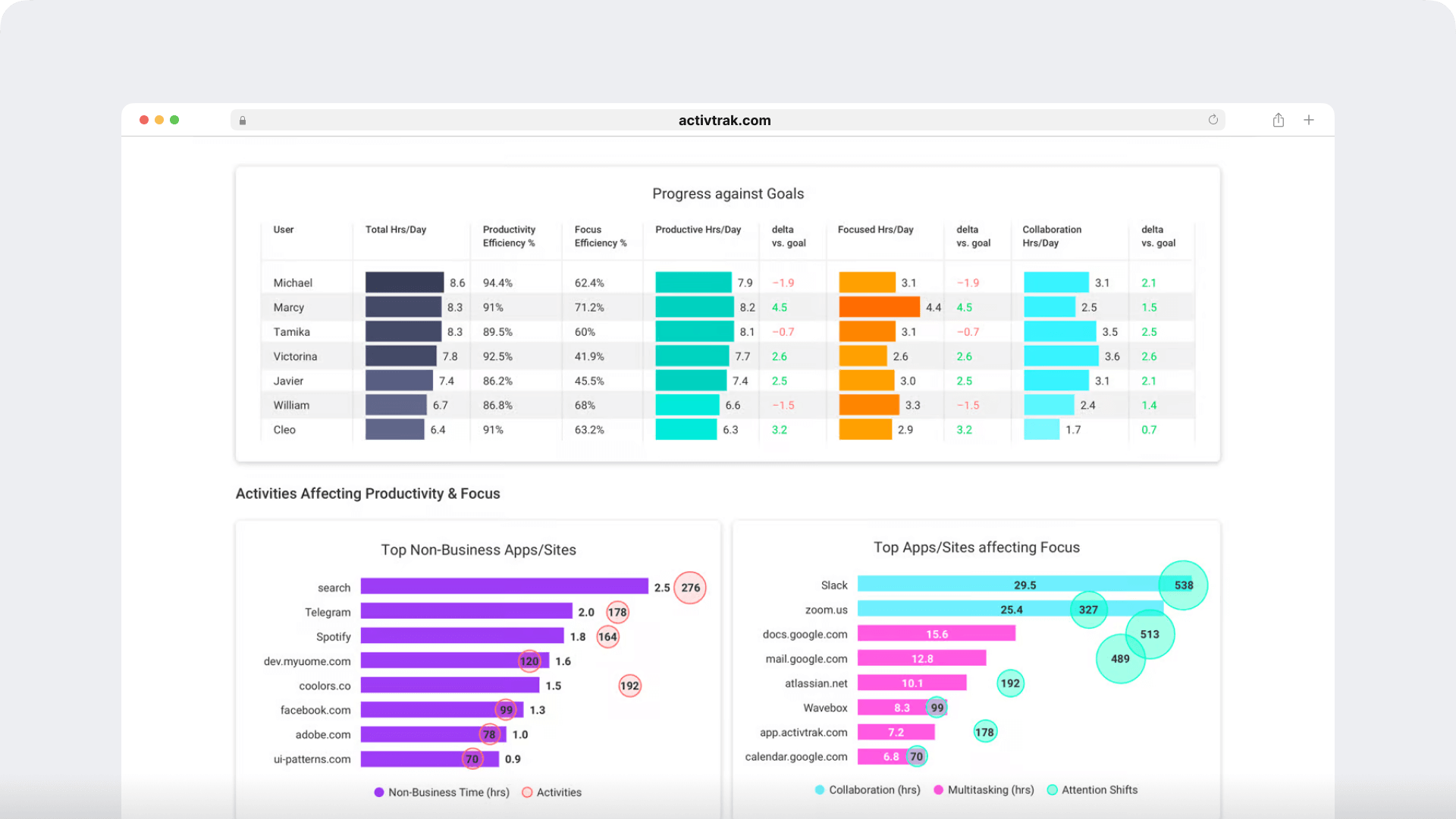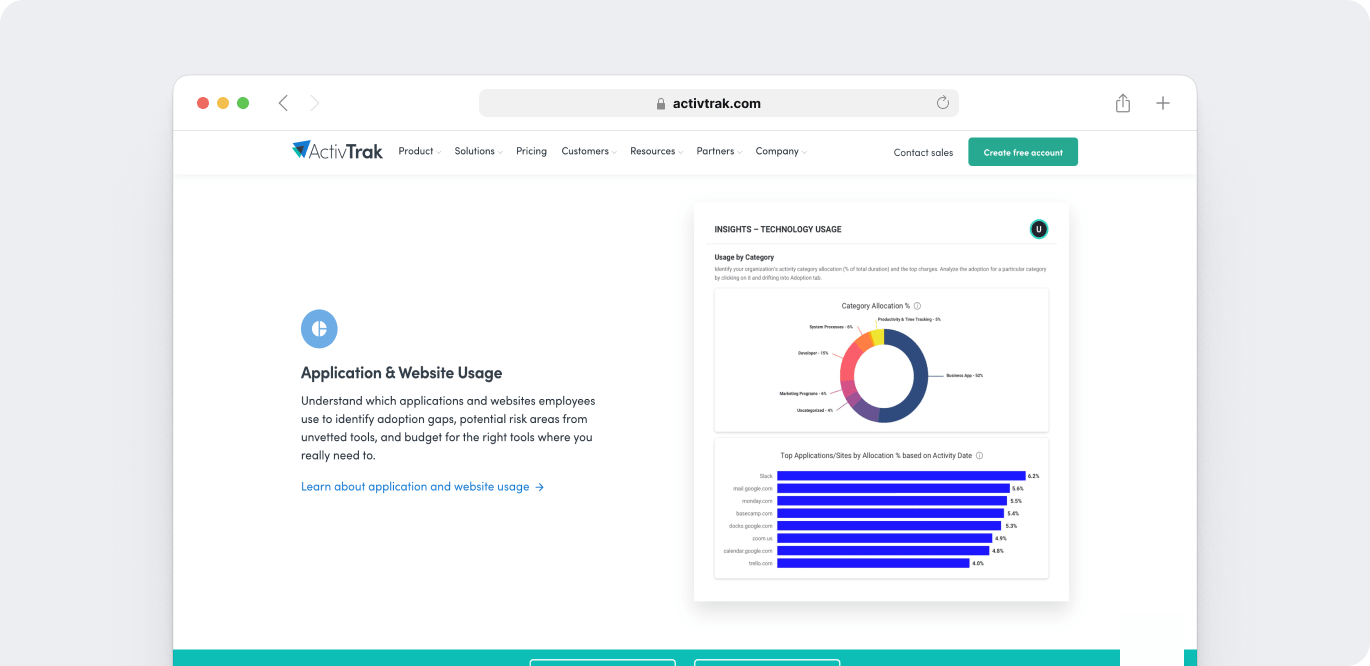ActivTrak and Hubstaff are excellent time and productivity management tools used by companies to optimize their work processes.
Even though ActivTrak and Hubstaff offer similar features, both software take different approaches while monitoring employee activity and productivity.
Looking for a comprehensive ActivTrak vs Hubstaff comparison?
You’ve come to the right place.
In this article, we’ll compare Hubstaff vs ActivTrak in depth to better understand the two. We’ll also introduce you to an excellent alternative to help you skyrocket your teams’ productivity.
Table of Contents
Let’s get started!
ActivTrak vs Hubstaff: An overview
Before we get to the details, here’s a quick overview of features offered by both software.
| Feature | ActivTrak | Hubstaff |
| Time tracking | automatic time tracking | automatic and manual time tracking modes |
| Screenshot monitoring | Captures screenshots of specific activities or the entire work shift | Captures 1-3 screenshots every 10 minutes |
| Website and application usage | Runs in the background and classifies apps and websites as productive or unproductive | Monitors website and app usage to track tools your workforce uses |
| Reporting | Offers top users, productivity, top websites, top applications, top categories, working hours, and activity reports | Offers attendance, productivity, budget, and scheduling reports |
| Invoicing | Doesn’t offer invoicing feature | Automatically converts tracked time into invoices |
| Scheduling | Creates employee schedules and tracks time for that particular schedule | Creates schedules and sends a notification to employees about their upcoming tasks |
| Integrations | Offers 20 integrations | Offers 30+ integrations |
| Pricing | $0 – $19/user per month | $0 – $25/user per month |
Let’s explore these features in detail.
ActivTrak vs Hubstaff: Detailed comparison
Here’s a detailed look at what each software has to offer:
1. Tool overview
Before we compare Activtrak and Hubstaff features in detail, here’s a quick rundown of software:
A. ActivTrak

ActivTrak is a workforce analytics tool used for productivity management and employee monitoring by freelancers and small, medium, or large businesses.
The cloud-based employee management software helps you in:
- Monitoring employee performance of on-premises and remote team
- Workforce optimization.
- Improving employee engagement and experience.
ActivTrak is compatible with Windows and Mac. It also has user-friendly apps for iPhone and Android devices.
B. Hubstaff

Hubstaff is a workforce management and time tracking software with advanced reporting and time clock features. It can be used by small businesses or medium and large businesses to track employee time and monitor their productivity.
The tool also has GPS tracking to track employee location for on-field employees.
Hubstaff is available for Windows, Mac, and Linux devices. It has user-friendly mobile apps for iPhone (iOS) and Android devices. You can also use Hubstaff on your web browser using its Chrome extension.
Now let’s look at ActivTrak vs Hubstaff features in detail.
2. Time tracking
Here’s how the time tracking feature works in both software.
A. ActivTrak
The tool has an automatic time tracker that starts tracking time as soon as you turn on your computer and ends when you shut it down. You don’t have to clock in or press any buttons.
To activate the tracker, you need to download and install the tool on your device. It will automatically run in the background, tracking time and categorizing work as productive or unproductive.

B. Hubstaff
The tool lets you track time automatically. Employees can also manually add time entries to their accounts for offline work.
With Hubstaff, you can start and stop time tracking with the click of a button.
The tool is useful when managing remote work teams because you can track your team’s time while they work from different locations.
Hubstaff summarizes all tracked time and data into automatically generated timesheets.
This gives an accurate representation of work done by the employees on a daily, weekly, and monthly basis. Employees can also edit the timesheets manually before they are approved.
The time tracking feature is available in all Hubstaff products, such as Hubstaff Desk, Hubstaff Time, and Hubstaff Field, but all three use this feature differently.

Quick recap
While Hubstaff supports manual and automatic time tracking, ActivTrak only offers an automatic time tracking feature.
3. Screenshot Monitoring
Here’s how both software monitor employee activity through screenshots,
A. ActivTrak
ActivTrak allows managers to take screenshots of their team member’s activities throughout their shift or during specific activities.
In ActivTrak, all screenshots are enabled by alarms. To allow ActivTrak to take screenshots, you first have to set up “Custom Alarms” and “New Activity Screenshots” in your dashboard settings. You can also set the time duration for screenshots to be captured. For example, one screenshot every ten seconds, etc.
ActivTrak also gives managers the option to disable the screenshot feature due to compliance, employee privacy, and storage issues. You can also delete the screenshots as required.

B. Hubstaff
Managers can take 1-3 screenshots of the employees’ screens every 10 minutes while tracking time. These screenshots can be accessed from the activity monitoring tab and deleted if needed.
As a manager, you can enable, disable, or blur screenshots from the settings tab, making employee tracking simple and unobtrusive.
Hubstaff can also evaluate team productivity through mouse movements and keystrokes.

Quick recap
Both Hubstaff and ActivTrak allow you to monitor employee activity by taking regular screenshots.
4. Website and application usage
Here’s how the software monitors employee web and application usage.
A. ActivTrak
Activtrak tracks screen time and application usage, which gives managers insight into how employees spend most of their time during work hours. It does this by collecting data from website titles and URLs accessed by the employees and taking regular screenshots of employee activities.
It categorizes the websites and apps by type, such as email apps, sales tools, and meeting software.
It also helps you assess if excessive use of social media during working hours is causing distraction among employees.

B. Hubstaff
With Hubstaff, you can get insights into what websites and apps your workforce uses the most and identify the causes of distractions.
You can also set permissions on websites and applications so that employees can only access the sites relevant to their job role.

Quick recap
Both software can track website and app usage to monitor employee activities and help in distraction management.
5. Reporting
Here are the detailed reports generated by both software.
A. ActivTrak
The software generates multiple reports in its Live reports section.
These reports are generated for categories like top users, applications, working hours, and activity logs.
It generates extensive productivity reports showing how much time your employees spend on productive and unproductive activities. You can also view when your employees take a break and what applications they use the most.
In ActivTrak, you can also check the workload balance in the productivity report. This is essential to assess employees who are at risk of burnout and the factors that contribute to it.
The tool can help you determine where working hours are spiking or are consistently high and identify team members who require assistance.

B. Hubstaff
Hubstaff generates extensive and detailed reports, which include timesheets, attendance, budget, project, and scheduling reports.
You can customize these reports to filter out information based on team, project, client, day, week, and month.
The Time & Activity report is among the most valuable reports regularly reviewed by businesses to achieve maximum team productivity. The report contains details of the total time tracked, employee activity percentage, and billable hours of any user for a project or task.

Quick recap
Both software offer a wide range of customizable reports.
6. Invoicing
Here’s how the software helps with invoicing.
A. ActivTrak
ActivTrak does not offer an invoicing feature.
B. Hubstaff
Hubstaff lets you convert your billable hours into invoices.
It can automatically generate invoices based on your tracked time and manual time entry data. Hubstaff also integrates with other accounting and bookkeeping software to generate invoices and store all your data in one place.
You can send unlimited invoices to your clients directly from the Hubstaff app and receive online payment reminders. You can also export the invoices for your record and share them via email.

Quick recap
ActivTrak does not support invoicing, while Hubstaff automatically converts billable hours into invoices.
7. Scheduling
Here’s how you can set up and create employee schedules in ActivTrak and Hustaff.
A. ActivTrak
ActivTrak has a scheduling feature that allows you to create employee schedules.
Here’s how it works:
- Toggle on Setting and Scheduling on the left side of the screen.
- Create a Schedule for each team member.
- Once you create a schedule, select the checkboxes on the left, and click on the Select Schedule button in the top right to assign a schedule.

B. Hubstaff
With Hubstaff Time, you can plan, manage and schedule employee shifts and track their attendance. You can also monitor other scheduling add-ons, such as late shifts, missed shifts, and abandoned shifts.
Here’s how you can create schedules in Hubstaff Time:
- To make a new schedule, go to Actions > Create shifts and select a user’s name.
- Fill in information like username, shift duration, minimum hours, number of days, etc.
- Once the schedule has been created, you can access it on the schedule screen in daily, weekly, or monthly views.

Quick recap
Both Hubstaff and ActivTrak offer the scheduling feature. But with Hubstaff, you can monitor additional schedule data like late shifts, missed shifts, and abandoned shifts.
8. Integrations
Here are some of the integrations offered by both software.
A. ActivTrak
ActivTrak offers integrations with around 20 tools. These include:

B. Hubstaff
Hubstaff offers 30+ third-party integrations that can help you organize your workflows.
These include project management, CRM, and accounting tools like:

Quick recap
Hubstaff offers more integrations than ActivTrak.
9. Pricing
Here’s a look at the ActivTrak and Hubstaff price plans.
A. ActivTrak
The software has a 14-day free trial of its professional plan with no credit card details required. It also offers a free plan for up to three members. The basic paid plan starts at $10 per user/month, billed annually.
B. Hubstaff
The software offers a 14-day free trial with a 30-day money-back guarantee. It also offers a free plan for one user. The basic time tracking plan starts at $5.83 /per user/month, billed annually.
Quick recap
Hubstaff is more affordable than ActivTrak.
Hubstaff takes a holistic approach toward team management and productivity, whereas ActivTrak focuses on workforce analytics and acts as an employee monitoring software.
But before you make a decision, let’s check out these tools’ drawbacks.
Limitations of ActivTrak and Hubstaff
While both software offer multiple employee and productivity monitoring features, they have their set of limitations too.
Here are some drawbacks of ActivTrak and Hubstaff software.
- ActivTrak doesn’t offer real-time location tracking, invoicing, and an automatic payroll management system.
- ActivTrak also doesn’t offer an attendance tracking feature.
- Hubstaff doesn’t use pop-up alerts to encourage idle employees to focus on their work.
So, why not consider using an advanced tool that can track time, generate detailed productivity reports, and make payouts a hassle-free process?

A powerful employee monitoring alternative: Time Doctor
Time Doctor is a robust time tracking and employee monitoring software. Major companies, like Ericsson, and small businesses, like Thrive Market, use it to boost employee productivity.
Here are some of Time Doctor’s features:
- Offers manual and automatic time tracking modes.
- Time Doctor tracks idle time and sends pop-up alerts after a certain period of inactivity.
- Time Doctor can generate a number of automated reports to provide valuable time and productivity insights, including, Timesheets and Hours tracked reports, Activity summary reports, etc.
- It tracks the websites and app usage of employees and classifies them as productive or unproductive.
- You can also take screenshots for screen activity monitoring (optional).
- Time Doctor offers 60+ integrations through its Chrome extension. Some of them include Jira, Asana, Paypal, Payoneer, and Google .

Check out all the features of Time Doctor to learn more about the tool.
Wondering how much this tool costs?
Time Doctor is an affordable time tracking software alternative, and its basic plan starts at $7/user per month.
You can also get a 14-day free trial which doesn’t require you to add any credit card information.
Wrapping up
ActivTrak and Hubstaff are effective time tracking and employee monitoring tools that boost your team’s productivity.
While Hubstaff takes a holistic approach toward team and productivity management, ActivTrak focuses on workforce analytics and acts as an employee monitoring software.
But, if you’re looking for an all-in-one employee productivity management tool that allows you to track time, manage payrolls, and monitor employee activity, try Time Doctor.
Why not sign up for the 14-day free trial today?


